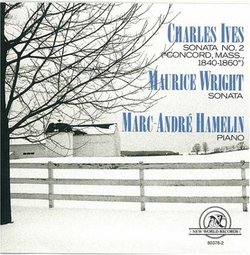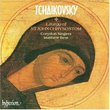| All Artists: Charles Ives, Maurice Wright, Marc-Andre Hamelin Title: Ives: Sonata No.2 "Concord, Mass" Members Wishing: 2 Total Copies: 0 Label: New World Records Release Date: 12/8/1992 Genre: Classical Styles: Forms & Genres, Sonatas, Historical Periods, Modern, 20th, & 21st Century, Symphonies Number of Discs: 1 SwapaCD Credits: 1 UPC: 093228037828 |
Search - Charles Ives, Maurice Wright, Marc-Andre Hamelin :: Ives: Sonata No.2 "Concord, Mass"
 | Charles Ives, Maurice Wright, Marc-Andre Hamelin Ives: Sonata No.2 "Concord, Mass" Genre: Classical
|
Larger Image |
CD DetailsSimilar CDs
|
CD Reviews(No title). offeck | New York, NY -- United States of America | 12/07/2000 (5 out of 5 stars) "What a fine reading of dedication and imaginative freedom Hamelin gives the Concord Sonata! Really, he gives you a perfect glimpse into the mind of Ives, the most authentic voice of musical transendentalism -- more than enough feel for the impetus and drive, majesty and power, profound wonder and uncannily moving expression, contrasting harmonics and intensely poetic inward reflecting mind-scapes. Everything is marvelously controlled, and the alterations and responses between maelstrom and mysticism, culminating in a dazzlying and dizzying arsenal of fireworks is enough to knock off your socks! Mind you, the Wright Sonata, in many shades similar to Ives, is anything but filler! This piece, celebrating the rhythmic declamations and strong delineated emotional states of loneliness and rotating stillness, of silence itself, makes for an extraordinarily memorable experience under the hands of this God-sent pianist." Best recording of Concord James B. Sinclair | New Haven, CT | 01/07/2004 (5 out of 5 stars) "There are a bunch of recordings of Concord. This one captures the depth and granduer. In addition, Hamelin has the chops to really go at the work and the smarts to listen to Ives's own examples of how to play Ives." New Ives scarecrow | Chicago, Illinois United States | 03/25/2009 (5 out of 5 stars) "Yes Hamelin quite evenly brings a more modernist sensibility to this work,really a great piano solo that has been left in mothballs by previous neo-romantic renderings,This is easy to comprehend in that most pianists repertoire has a heavy-laden diet of romantic everything, "grosse bauch" of the piano's spirit, It doesn't work in Ives, and Hamelin proves it;He is not afraid of augmenting the work's more "irrational" sides, dimensions whereas some previous are all looking for the romantic lyricism in the work. It is there but if that's all you find, well, the work is not what it could have been, or should have been,so the "Concord's" previous "beings" have to some degree been compromised;the work is strong enough to withstand such transgressions, even the needless orchestrations of it; the vision previously I suppose, when this work first came out,Kirkpatrick's pioneering work and recording;it's useful and does document what this work was in the Thirties, there was hardly a modernity known in consciousness then,Varese, Webern were all unknowns in the USA then, still are for the most part; but if you place Ives in the 19th Century well you completely misunderstand his work, it is a useful argument, his own iconic places, situations, "object petit a"(Lacan sources) are all relevant, but then leaving those images intact without comment, or reflection doesn't make those pop, civil war tunes sound fresh and exciting, Hamelin's very clear,clean balanced approach high energy brings to life the arduous densities much of the time;, and he has direct gentle reflections like the beautiful forearm clusters in "Hawthorne" movement, you barely notice them, well Hamelin is a master purveyor of vast swabs of impacted arduous piano densities, as his work in/with the music of Sorabji, even transcribing the illegibly hand of Sorabji,as the "Transcendental Etudes" begun in 1989;
So Ives lives again with this very intense, mind-boggling reading,interesting what this does is set a precedent, for any Ives piano solo played and read;" |

 Track Listings (7) - Disc #1
Track Listings (7) - Disc #1

